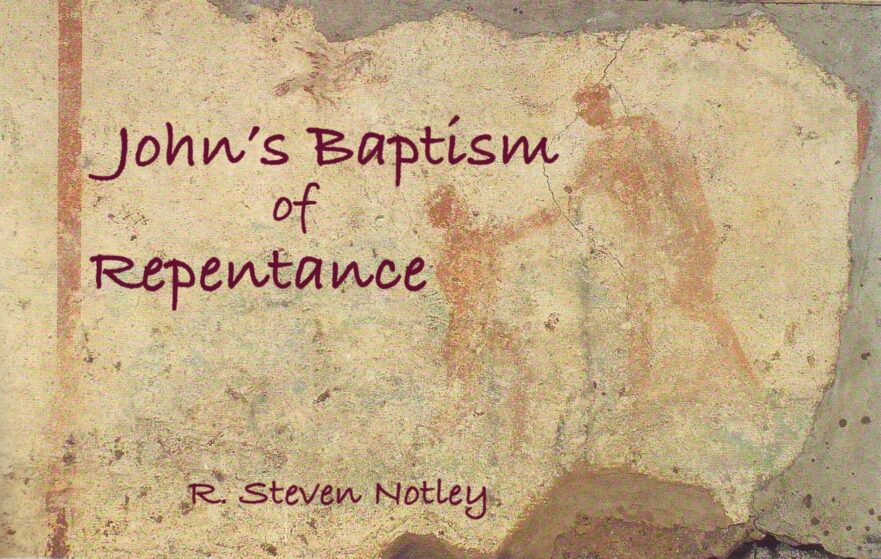How to cite this article: R. Steven Notley, “John’s Baptism of Repentance” Jerusalem Perspective (2004) [https://www.jerusalemperspective.com/6137/].

During a season of the Jewish calendar each person is expected to reflect upon his or her actions during the past year. Commencing with the Jewish New Year there are ten days in which one is to reconcile relationships in anticipation of the Day of Atonement. This season of repentance and reconciliation echoes the voice of one whose prophetic message was permeated with a call to repentance. All of the Gospels open with a description of John the Baptist’s proclamation of a “baptism of repentance for the forgiveness of sins” (Mark 1:4). In this brief study we want to consider both the form of John’s baptism and his distinctive call to accompanying repentance.
Immersion and Ritual Impurity
Many Christians are surprised to discover that John’s invitation to ritual immersion was nothing new for his Jewish hearers. Although scant mention is made of the practice in the Hebrew Scriptures, by John’s day the custom was already well developed. According to Jewish faith one undergoes immersion if there is any question of ritual impurity. This can result from a number of causes, many in the natural course of life—for example, after childbirth.
Premium Members and Friends of JP must be signed in to view this content.
If you are not a Premium Member or Friend, please consider registering. Prices start at $5/month if paid annually, with other options for monthly and quarterly and more: Sign Up For Premium
Conclusion
Once again we find that characters in the New Testament story belong to emerging Jewish ideas in the first century and were inseparably connected to that vital spiritual community. The message of the New Testament takes on new depth and meaning when read in the context of that historical and spiritual milieu.
- [1] See Chana Safrai, "Jesus’ Devout Jewish Parents and Their Child Prodigy" —JP. ↩
- [2] See Robert L. Lindsey, “The Major Importance of the 'Minor' Agreements,” under the subheading "An Un-Hebraic Element in Mark’s Version of Jesus’ Baptism" —JP. ↩




Comments 1
One reader asks:
One thing which puzzles me about “John’s Baptism of Repentance” and which I am seeking clarification is his assertion that the Jewish ritual baptism was a thrice baptism. I had always assumed that the Trinitarian formula in the Didache was a later redaction, because in the section on the Eucharist, it says that only those baptised in the name of the Lord could participate.
I have always thought that “baptised in the name of the Lord” was the original formula for baptism in early Christian communities. If the Jewish baptism was indeed a thrice immersion, that would easily translate into the Christian Trinitarian formula. Does anyone know Mr. Notley’s sources for that information? Can anyone suggest any further reading?”
Dr. Notley replies:
A quick response regarding Jewish thrice immersion. I gave no reference to it because it grew out of discussions over the years with Flusser. He is the only one that I have heard make a connection between Jewish thrice immersion and the trinitarian formula in Matthew 28:19-20. He spoke of the practice as common knowledge–like so many other aspects of Jewish practice of which Christians are unaware. There is a nice brief discussion by Posner in his article “Ablution” in the Encyclopedia Judaica cols. 81-86. In the article he states, “According to law one such immersion is sufficient, but three have become customary” (82). I know of no discussion of the origins of thrice immersion in the primary sources.
Nevertheless, we may see influence from this pre-existing Jewish practice on the “thrice pouring” of Didache 7:3. This may indicate the antiquity of the tradition (i.e. at least first century CE). It was Flusser’s contention that the practice gave rise to the trinitarian formula not the reverse, as is often assumed in scholarship. His contention makes sense–one can hardly explain thrice immersion in Judaism for trinitarian reasons!
For further reading you might look at The Didache, Huub van de Sandt and David Flusser (Fortress Press, 2002) 273-291.